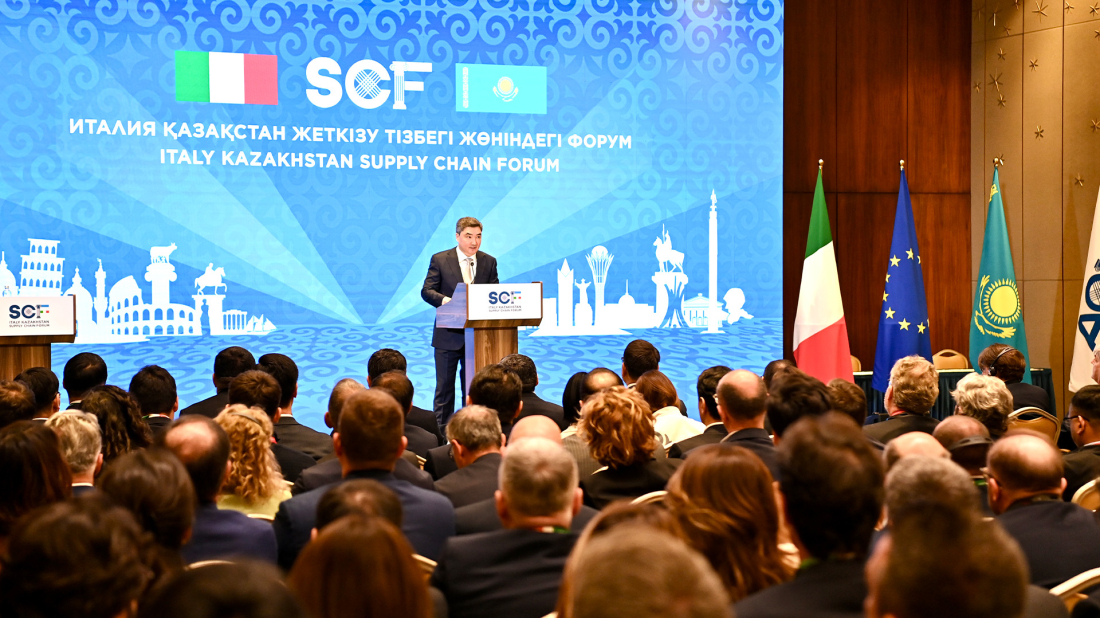Ukraine imposes new sanctions targeting Russian maritime and defence supply chains
Ukraine’s President Volodymyr Zelenskyy has approved new sanctions targeting Russian maritime operators, defence-linked companies and individuals co...

Italy and Kazakhstan are expanding their economic cooperation, with more than $8 billion in potential partnerships under discussion across critical sectors such as energy, agriculture, logistics, and technology.
The Italy-Kazakhstan Supply Chain Forum, held on May 28 in Astana, served as a key platform to advance bilateral trade and industrial ties just ahead of the Astana International Forum (AIF) on May 29–30.
Organized by the Italy-Kazakhstan Trade Association (ACIK) alongside national agencies and business leaders, the event built on the momentum of last October’s bilateral forum in Milan. It also laid the foundation for the next round of talks to be held in Italy.
Kazakh Prime Minister Olzhas Bektenov emphasized the growing strategic partnership between the two countries, highlighting Italy’s longstanding investment in sectors such as energy, pharmaceuticals, chemicals, and machinery. He noted that bilateral trade rose 25% in 2024, reaching nearly $20 billion, with $18 billion in Kazakh exports. In Q1 2025 alone, trade hit $4.4 billion.
“Italy remains among our top five EU investors, with $7.6 billion invested over the past 20 years,” said Bektenov. “Our government is focused on improving the investment climate with incentives like tax and customs benefits, infrastructure support, and a responsive legal environment.”
New Agreements and Sectoral Focus
The forum resulted in 10 memoranda of understanding worth €180 million (approx. $204 million) in areas such as petrochemicals, machinery, agriculture, metallurgy, and logistics digitalization. These agreements aim to position both countries for joint production projects targeting European, Central Asian, and Chinese markets.
Kazakh Minister of Trade and Integration Arman Shakkaliev called the event a “milestone” in bilateral ties, emphasizing Kazakhstan’s role as a key Eurasian transport and logistics hub, especially via the Trans-Caspian International Transport Route (TITR) or Middle Corridor, which saw a 63% increase in cargo in 2024.
Kazakhstan proposed several initiatives including:
Agricultural exports were also spotlighted, particularly organic grain, oilseeds, and animal feed.
Industrial Integration and Workforce Development
Maire Group CEO Alessandro Bernini praised Kazakhstan’s transformation since the 1990s, pointing to vast industrial opportunities for Italian firms.
“We encourage Italian companies to establish a permanent presence in Kazakhstan,” Bernini said. “The country is in the midst of major industrial investment, and we can accelerate the modernization of local companies by working together.”
Maire Group is already collaborating with local universities to recruit and train graduates for the growing industrial sector.
Challenges for SMEs and Support Solutions
Livio Mazzuoccolo, General Manager of Confindustria, noted that many European SMEs lack adequate preparation when entering Kazakhstan or Central Asia. He said proper registration and market integration typically take 16 months, and that sectors like oil and gas require additional licensing steps.
To better support Italian SMEs, Confindustria is transforming its Kazakhstan office into Confindustria Central Asia and Caucasus, aimed at streamlining market entry and offering targeted guidance.
Energy Transition and Strategic Geography
Paolo Arrighetti, SVP at Ansaldo Energia, highlighted Kazakhstan’s balanced approach to the energy transition — promoting renewables while converting coal-fired plants to gas-powered systems to ensure grid stability.
“These forums are essential for launching meaningful collaborations,” said Arrighetti. “Kazakhstan’s location — between China, Russia, and Europe — makes it an emerging regional hub amid global realignments.”
He concluded that instability elsewhere has created opportunities in Central Asia, and that Kazakhstan is uniquely positioned to serve as a stable, innovation-driven partner in this new geopolitical landscape.
Quentin Griffiths, co-founder of online fashion retailer ASOS, has died in Pattaya, Thailand, after falling from the 17th floor of a condominium on 9 February, Thai police confirmed.
Ukraine’s National Paralympic Committee has announced it will boycott the opening ceremony of the Milano Cortina 2026 Paralympics in Verona on 6 March, citing the International Paralympic Committee’s decision to allow some Russian and Belarusian athletes to compete under their national flags.
Eric Dane, the actor best known for his roles in 'Grey’s Anatomy' and 'Euphoria', died on Thursday, at the age of 53 after a battle with amyotrophic lateral sclerosis (ALS). His family confirmed his death after what they described as a “courageous battle” with ALS.
An Austrian climber has been convicted of gross negligent manslaughter after his girlfriend died from hypothermia while climbing Austria’s highest peak, the Grossglockner, in January 2025.
President Donald Trump said on Saturday (21 February) that he will raise temporary tariffs on nearly all U.S. imports from 10% to 15%, the maximum allowed under the law, after the Supreme Court struck down his previous tariff program.
Iran announced on Saturday that it has designated the naval and air forces of European Union member states as “terrorist entities” in a reciprocal move after the EU blacklisted the Islamic Revolutionary Guard Corps (IRGC).
At least 10 people were killed and 50 wounded in Israeli strikes in Lebanon's Bekaa Valley on Friday (20 February), two security sources told Reuters, after the Israeli military said it had targeted Hezbollah sites in the Baalbek area.
Iran’s Foreign Minister Abbas Araghchi on Saturday (21 February) dismissed U.S. claims that 32,000 civilians were killed during protests in Iran. He said Tehran has already released official figures and called for evidence to support any higher estimates.
Uzbekistan's president Shavkat Mirziyoyev has held a series of high-level meetings in the U.S. aimed at strengthening bilateral economic and strategic ties between the two countries.
Türkiye has signalled readiness to contribute to a proposed Gaza stabilisation force during the inaugural Board of Peace meeting on Thursday (19 February), but according to former Turkish diplomat Mehmet Öğütçü, the decisive factor will be whether Israel and the United States agree on Ankara’s role.
You can download the AnewZ application from Play Store and the App Store.

What is your opinion on this topic?
Leave the first comment